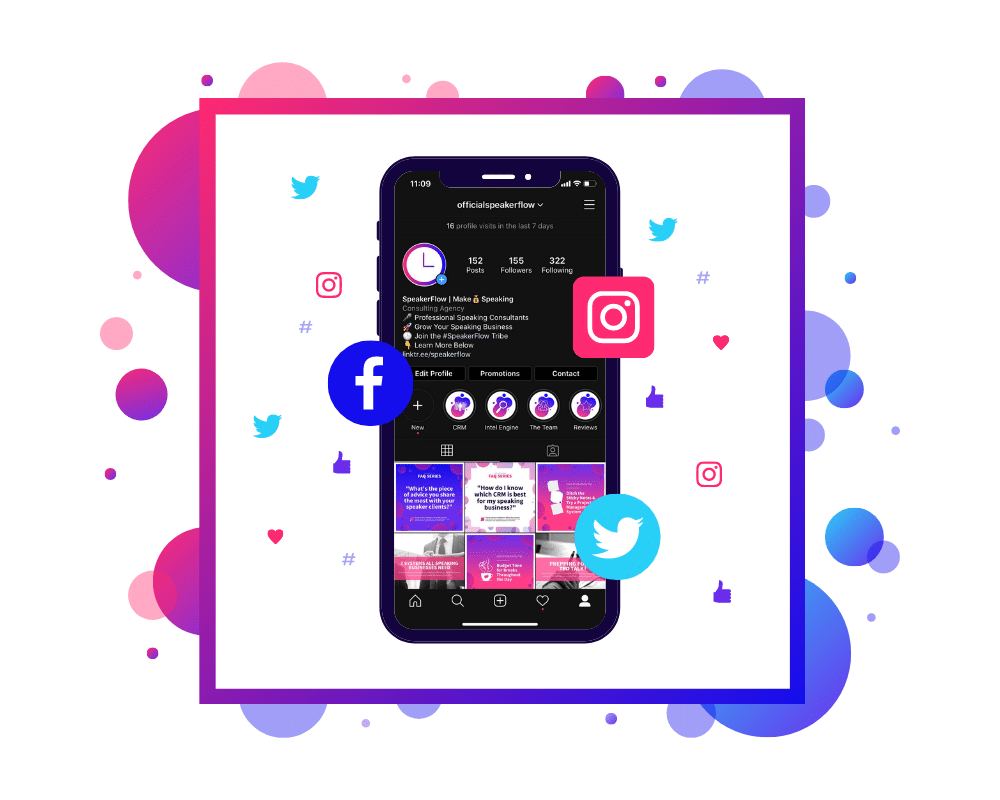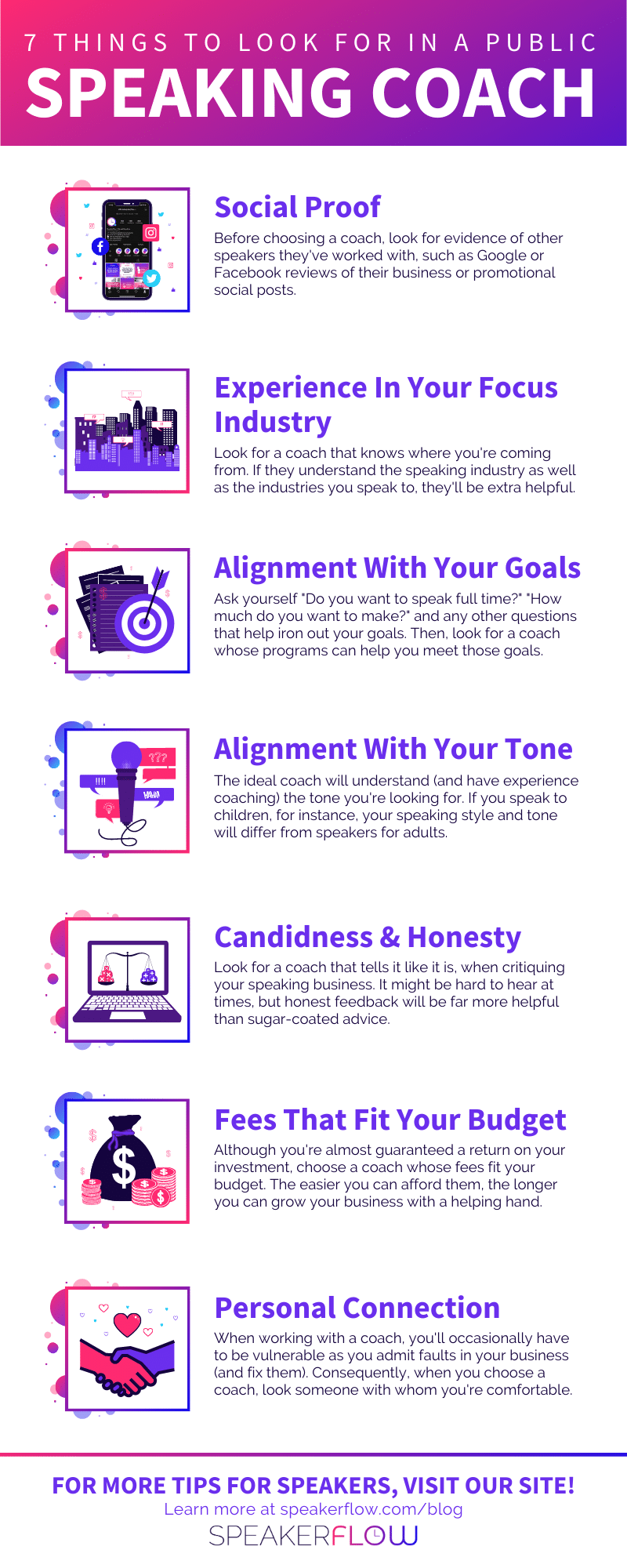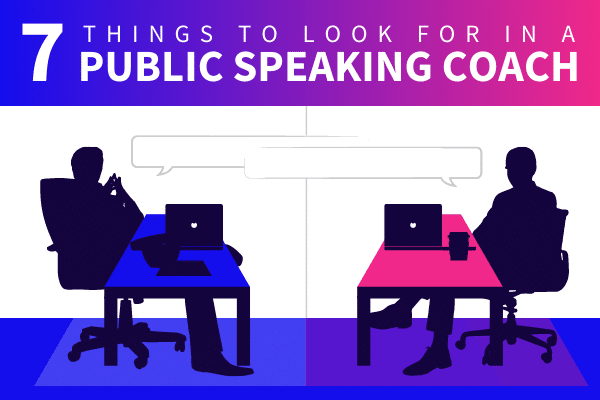Every speaking business owner has felt overwhelmed at some point in their industry experience. Maybe their sales dried up. Maybe a big speaking opportunity fell through, or maybe the industry changed more quickly than anticipated. You may have even experienced this yourself at the beginning of 2020, as the industry made a dramatic shift towards virtual speaking rather than live events. However, regardless of what has caused you stress in the past, one of the greatest gifts – and most unique components – of professional speaking is the willingness of industry experts to work together in times of crisis. That’s where a public speaking coach or speaking business consultant comes in!
Generally, there are three “types” of speaker coaches. First are those that focus solely on speaking. Second are those that specialize in speaking business processes (like SpeakerFlow!), and third are those that specialize in both of these areas. In this guide, rather than focus on a single type of coach, we’re going to cover seven universally important things to look for when you choose a coach of any kind. That way, whether you’re looking for speaking help or business advice, you’ll be able to hit the ground running.
Social Proof
When considering a public speaking coach, the first thing to look for is social proof. Nowadays, starting a business still comes with its fair share of challenges, but gaining visibility has never been easier. There’s Facebook, Twitter, and Instagram, not to mention paid advertising. Because of the abundance of these channels, the key thing to look for on each of them is evidence from a coach’s past clients.

On Facebook, for example, look for reviews from previous speakers the coach has worked with. Then, consider those speakers in more detail. How do the challenges they mention in their review (the ones their coach solved) reflect the challenges you’re facing now? How many positive reviews does the coach have relative to negative reviews? Do the reviews mention the problems you’re facing and the results you’re hoping to achieve from working with a public speaking coach?
Another place to look is LinkedIn. Like Facebook, a LinkedIn business page can be a solid source of reviews. Alternatively, however, it can also be useful to appeal directly to other professional speakers in a gold ol’ LinkedIn post. It seems simple, but considering how much the industry functions on networking, it never hurts to hear if anyone in your network has worked with a given coach before. Plus, if they’re someone you already know, you’re likely to get a more detailed answer to “What was your experience like with this coach?” than you would from a review.
These are just a few examples of what to look for when considering a coach’s social proof. Beyond these, the important thing to remember is to look for evidence that (a) other speakers similar to you have worked with this coach before and (b) they saw significant improvements to their speaking business based on that collaboration.
Experience In Your Focus Industry
Similarly to reviews, the second thing to seek out when considering a public speaking coach is experience in your focus industry. If you’ve read any of SpeakerFlow’s blogs before, you already know that narrowing your speaking focus is something we strongly recommend if you want to boost sales in your business. After all, if you’re tailoring your attention – and your speaking materials – to a few key groups, it’ll be easier to prove to decision-makers in those groups that you’re worth hiring.

When choosing a speaking coach, it’s equally valuable to select someone who has experience in the same industries you do. If you’re a speaker for children or young adults, for example, there are a few things you probably stick to, as a general rule. For one thing, you probably avoid profanity and any remotely suggestive humor in your presentations. You also have to approach decision-makers with the knowledge that they’re never going to benefit, personally, from your presentations. Sure, they decide which speaker is hired, but the content of your presentation isn’t intended for them. It’s for the children they represent. As a result, each sale isn’t just a pitch to an event planner but also a demonstration of your speaking and teaching skills and your comfort with children. A coach needs to understand these general rules and obstacles if they’re to help you sell more easily.
In the same way, whatever your preferred industry is, your goal is to find a public speaking coach that understands how that industry intersects with the speaking market. That way, they won’t just make you a better speaker in general. They’ll also directly increase your value for the people you’re already targeting.
Alignment With Your Goals
Besides social proof and industry experience, another thing to look for in a public speaking coach is alignment with your goals. Initially, I mentioned there are three main types of coaches. However, beneath those labels are a myriad of other specialties, such as TEDx or Toastmasters coaches, emceeing or keynote speaking experts, etc., each of which you must consider relative to your own goals.

For example, one of our past clients at SpeakerFlow approached us originally with a few goals in mind. She wanted to iron out her business processes, develop a better sales cadence for contacting to new leads, and become a more confident speaker. Overall, she also wanted to gain a better understanding of how the different components of her speaking business worked together, so she could outsource some of those components in the future. In this case, the SpeakerFlow team was the perfect fit for three of these four goals, and, by the time she moved on, we’d helped in every way we could. Business processes? Check. Better sales cadences? Check. Learning to outsource? Check! From there, the only other coach she had to look for was one to help tackle her public speaking goals.
Likewise, when you’re searching for a public speaking coach, you may not be able to meet all of your goals with one coach’s program. You may have to hire two different coaches, one for business and one for speaking. Plus, hiring a coach isn’t always a “one-and-done” deal. You may have to hire a few coaches, as your business grows and you come up against new challenges, too. The main thing to keep in mind is choosing someone that can help you meet your current goals. Then, if you need more guidance when your goals get bigger, that’s okay, too.
Alignment With Your Tone

Like your goals, the fourth thing to look for in a public speaking coach is alignment with your tone. As far as professional speaking goes, there’s plenty of variety when it comes to speakers’ presentation styles. Some speakers are serious while others use elements of stand-up comedy. Some speakers are old fashioned and formal while others are much more conversational and relaxed. All in all, there isn’t a right answer to the question, “What tone should a professional speaker use in their presentations?” The only “right” thing to keep in mind is choosing a coach that (a) understands your speaking style and (b) has experience working with similar speakers.
A great example of this (again, from the SpeakerFlow team) was our experience with speaker and productivity expert Belinda Goodrich. When we first met Belinda, there were plenty of reasons our team clicked with her right away. She was funny and energetic, not to mention excited to learn and grow. But, the thing that stood out the most was what Belinda exclaimed when our CEO, Taylorr, mentioned our core value of “Get Sh*t Done”: “Hey! That’s the title of my book, Get It Done!” From there, she went on to show us a copy of her book, the title of which can also be read as “Get Sh*t Done,” and, as they say, the rest of our work together “was history.”
Although there were other reasons we were a good fit for Belinda’s speaking business, the first reason was that we had the same tone. We’re all about humor, authenticity, and – surprise, surprise – getting stuff done! In the same way, your speaking coach should match your tone, so you can not only get along on the personal side but also excel on the professional side.
[hubspot type=cta portal=5815852 id=7cff95fd-a207-455b-aed4-9364f424f159]
Candidness & Honesty
Next, the fifth thing to look for in a public speaking coach is an obvious one: candidness. If you’re currently looking for a coach, you’re probably already thinking, “I need to know what I’m doing wrong.” However, you may not be prepared for the inevitable companion to hearing what you’re doing wrong, i.e. the constructive criticism that comes from working with a coach. Don’t get me wrong. I don’t love criticism either, so if you’re not ready for it, I definitely understand.

But, working with a speaking coach is, in many ways, kind of like seeing a doctor for your speaking business. If you were to see a doctor for your physical health, you might not walk into their office expecting to leave with a list of dietary or lifestyle changes, but you would arrive with a problem. Maybe it’s pain, fatigue, irritation, or a fever. In any case, you know that something is wrong, and you need the doctor’s expertise to pinpoint the source of the problem. You also know that hearing “Everything is fine” and “You’re doing everything right” is not going to solve it, that even if it isn’t easy, adapting your diet or lifestyle is better than staying the same (and staying uncomfortable).
In essence, the best coaches provide the same level of honesty in regards to your speaking business. From their initial diagnosis of your business obstacles to their prescribed plan to tackle them, a public speaking coach is most helpful when they’re willing to say things you need to hear, even if they’re hard to listen to. As cheesy as it sounds, the phrase “There’s no growth in the comfort zone” is remarkable true, and accepting things you need to change is the first step to achieving that growth.
Fees That Fit Your Budget
Sixth on our list of things to look for in a public speaking coach (or their business, rather) is affordable fees. With any coach, it can be tempting to look at their program in terms of results like “I’ll be making so much more money once I implement this new sales process!” or “I’ll be so much more organized after I work through this new business plan.” Admittedly, in many ways, these are valid reasons to be excited, but it’s equally important to remember how much they cost.

If you’re working with an unlimited budget, on the other hand, sweet! Feel free to skip ahead to the next section. 👍
But, if you’re like the majority of speakers, and looking to make the most of a tight budget, below are a few options to keep in mind.
- If you don’t have a lot to spend, consider purchasing an hour or two of consulting from a coach. That way, you still get actionable advice and can come back for a more in-depth coaching program when you have a bigger budget.
- If you need immediate help, consider a coaching package that includes consulting and do-it-yourself resources. These allow you to get the insights you need – and for a reasonable amount of time – without having to pay for excessive consulting.
- Lastly, if you can predictably spend a few hundred dollars per month, consider a long-term consulting contract. These provide consistent consulting at a stable price, so you can steadily chip away at your concerns.
Additionally, if you don’t see a coaching package that fits your needs, it never hurts to ask! Many coaches started as speakers themselves and, consequently, are willing to work with you and help where possible, even if price is a concern. All you have to do is ask.
Personal Connection

Last but not least, when choosing a public speaking coach, look for someone with whom you can connect. When reading their reviews or meeting them for the first time, look for similarities or professional chemistry. More likely than not, as you work through a coaching program, your coach isn’t just going to be a consultant for you. They’re going to be a confidant, as you share your challenges and concerns and they help you tackle them. Plus, the better you get along with a public speaking coach, the more you’ll enjoy working with them, and the more you enjoy your time together, the more value you’ll see from it. What’s not to love about that?
Ultimately, choosing a speaking coach is a very personal decision. It depends on your experience in the speaking industry and your current business goals, to say nothing of your personal preferences. From our team to our yours, hopefully, this guide provides you with the stepping stones to make your choice easy, so you can get your concerns out of the way and your business back on track.
For more information about choosing a coach, check out our previous guides on how to maximize the effectiveness of a coaching program and how a speaking coach can impact your business. As always, feel free to also contact us at [email protected] and meet our own team of coaches for professional speakers. 🎤






